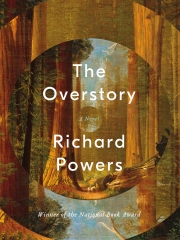The Overstory by Richard Powers
I was hesitant because I worried that a book about trees would be boring. As it turned out, if I were to summarize it, this really was a book about trees. It’s also one of the best books I’ve ever read. The short stories in the first half are all, on their own, some of the most riveting short stories. I actually thought the book would only be a collection of these short stories, but somehow all the characters came together – most as tree huggers – intertwined in a convoluted plot. I might be reading into it too much, but doesn’t the book structure seem symbolic of the author’s point that trees look independent but are actually all interconnected?
1) “A tree in the Bronx Zoological Park turns October colors in July.”
“October colors in July.” Four words, one vivid imagery. Also, I learned about the decimation of the American chestnut tree.
2) “A Moslem from the land of Confucius, going to the Christian stronghold of Pittsburgh with a handful of priceless Buddhist paintings. Who are we missing?”
I was really struck by how well the author writes an immigrant story.
3) “‘Best time to plant a tree? Twenty years ago.’ ‘Yep. And you always said the next best time was now.’ ‘Wrong. Next best time, nineteen years ago.'”
I didn’t particularly like Mimi Ma, but her dad is probably my favorite character in the book.
4) “Lenny breaks her elbow, by accident. In self defense, he keeps telling anyone who’ll listen.”
This is definitely a reference to Of Mice and Men.
5) “He doesn’t want to live in a world where twenty-year-olds die so that other twenty-year-olds can study psychology and write about fucked-up experiments.”
I wonder how much of the American psyche is defined by the Vietnam War.
6) “The day is one of those eerie Central Peninsula imitations of heaven – seventy degrees and clear, the air thick with bay laurel and eucalyptus. He drags along the familiar route at half his usual pace, past the modest middle-class bungalows that people will soon pay a million and a half for, just to tear down and rebuild.”
“Imitation of heaven” is an accurate description of the Bay Area. It’s like heaven, but if you look a little harder, it’s only an imitation.
7) “She has followed back roads from Las Vegas, capital of clueless sinners, toward Salt Lake, capital of cunning saints.”
What’s the capital of cunning sinners? Or clueless saints?
8) “‘Insurance is the backbone of civilization. No risk pool – no skyscrapers, no blockbuster movies, no large-scale agriculture, no organized medicine.'” – the lecturer
Same can be said of debt. No debt, no growth.
9) “She marvels again at how the planet’s supreme intelligence could discover calculus and the universal laws of gravitation before anyone knew what a flower was for.”
Every time I get sick, I’m shocked by how little we understand about the human body. We landed on the moon 50 years ago, but we still can’t do better than drink water and get some sleep.
10) “‘The only thing we know how to do is grow. Grow harder; grow faster. More than last year. Growth, all the way up to the cliff and over. No other possibility.'” – Patricia
Now that I’m more in the tech world and pay more attention to the markets, I’m constantly puzzled by how companies are expected to always grow faster. Profits must go up. Stock prices must go up. Everything must be up and to the right. I guess I would like to grow as a person, and if corporations were people, maybe it makes sense?
The last third of the book drags on a bit, but overall this book was extremely well written. The story really fits into the current zeitgeist, and in some ways, defines the environment we live in now. Oftentimes, I’m sad that there aren’t any books for x, so I’m glad that this book exists, for the trees.
